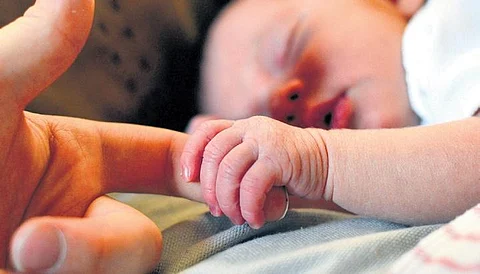

BENGALURU: Experts vouch for all government and private hospitals in Karnataka to be accredited under the Breastfeeding-Friendly Hospital Initiative (BFHI) to improve the inadequate breastfeeding levels in India.
Among the 23 district-level hospitals, 175 taluk-level hospitals and 501 private-run hospitals in Karnataka, only two hospitals from Bengaluru, Ramaiah Medical College Hospital and Rainbow Children’s Hospital are BFHI accredited.
Dr Sreedhara MS, consultant, neonatology and paediatrics, Rainbow Children's Hospital proudly stated that in 98 per cent of cases, the hospital has achieved adequate breastfeeding till the time a mother is discharged. The hospital is now taking efforts to extend it to a 3-6 months span where follow-ups are done with the mothers about their breastfeeding patterns.
| Total registrations under BFHI | 150 |
| Total registrations in South India | 77 |
| State with the highest registrations | Telangana |
| Registrations from Karnataka | 14 |
Doctors explained that a child misses the first opportunity of being breastfed for multiple reasons. Under circumstances when a mother after hours of labour tends to fall asleep, separating babies in caesarean section births, doctors must ensure that the baby is breastfed prior to it even for a few minutes.
The World Health Organisation (WHO) and United Nations International Children's Emergency Fund (UNICEF) launched the initiative in 1993. However, in 1998 the Indian government withdrew due to lack of funds.
A bottle-fed baby develops a 17 times higher risk of developing pneumonia or diarrhoea and long-term effects like diabetes, asthma or allergic diseases, Dr Sreedhara explained. There is a need for lactation consultants who train and educate new mothers about breastfeeding. In the absence of such consultants the nurses play an important role in doing that in a government set-up, he added.
| No of Institutional deliveries | 88.6% |
| Women breastfeeding in 1hr of birth | 44.8% |
| Women breastfeeding exclusively for 6 months | 63.7% |
| Women receiving adequate diet till 23 months | 11.1% |
Busting the breastfeeding-related myths, Dr Sreedhara added that first milk is very important for the baby. Even a little amount of milk in the first few hours is sufficient for the baby. A baby crying does not indicate hunger and formulas like sugar mixed with water or honey should be avoided, he added.
Keeping in mind the inadequacy in breastfeeding, Reema Dutta, programme officer, of BFHI, urged all private and government-run hospitals to register for BFHI accreditation.
Studies have shown that inadequate breastfeeding results in 1,00,000 preventable child deaths (mainly due to diarrhoea and pneumonia) 34.7 million cases of diarrhoea, 2.4 million cases of pneumonia, and 40,382 cases of obesity among children in India.
ALSO READ | Breastfeeding: Eat well to feed well
The health impact on mothers is more than 7,000 cases of breast cancer, 1,700 ovarian cancer cases and 87,000 of type-2 diabetes cases. Optimal feeding will lead to potentially reducing the risk of undernutrition, obesity or diet-related NCDs.